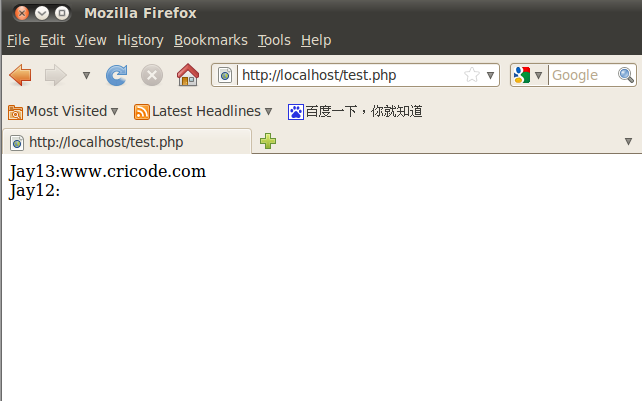Php-Redis安装测试笔记_php技巧
后端开发用到php操作redis,在此将安装测试过程中遇到的问题汇总记录下来,以便以后参考!(系统为ubuntu)
1.redis安装
下载地址:http://download.redis.io/releases/
解压安装:
tar -xvf redis-2.8.17.tar.gz
make
sudo make install
为方便使用,在/usr目录下创建redis目录,讲如下几个文件拷贝到/usr/redis/目录下:
/yourdir/redis-2.8.17/redis.conf
/yourdir/redis-2.8.17/src/redis-benchmark
/yourdir/redis-2.8.17/src/redis-server
/yourdir/redis-2.8.17/src/redis-cli
当然,你也可以通过软连接的方式达到方便使用的目的。此外,你也可以将redis-server加入开机启动,此处从略。
2.redis测试
1)先开启redis服务端程序
为方便测试,我们将redis.conf配置文件中的loglevel和logfile的值,修改后如下:
loglevel debug
logfile “/tmp/redis.log”
jay13@ubuntu:/usr/redis$ redis-server redis.conf
2)开启redi客户端,通过客户端向redis数据库中进行增删改查操作。整个操作过程中生成的日志可以到/tmp/redis.log中查看。
以最简单的key操作为例,实例如下:
jay13@ubuntu:/usr/redis$ redis-cli
127.0.0.1:6379> set jay13 jb51.net
OK
127.0.0.1:6379> set jay hello,world
OK
127.0.0.1:6379> get jay
"hello,world"
127.0.0.1:6379> get jay13
"jb51.net"
127.0.0.1:6379> del jay
(integer) 1
127.0.0.1:6379> get jay
(nil)
127.0.0.1:6379> set jay13 www.jb51.net
OK
127.0.0.1:6379> get jay13
"www.jb51.net"
3.安装phpredis扩展
在使用sudo apt-get install php5安装php时,默认是没有安装phpize的,我们安装phpredis时,需要用到phpize,因此,需要先安装phpize。
1)我们通过安装php开发者工具来获取phpize。执行如下命令即可:
sudo apt-get install php5-dev
2)获取phpredis源文件
最新的phpRedis地址:https://github.com/nicolasff/phpredis
按照GitHub上的说明进行如下安装时,
phpize
./configure --enable-redis-igbinary
make && make install
可能会出现如下出错说明:
checking for igbinary includes... configure: error: Cannot find igbinary.h
这个是因为我们没有igbinary扩展,这是phpredis依赖的一个东西。
好吧,怎么安装igbinary呢?
使用apt-get没有无法安装完成,我们通过下载安装文件进行安装。
wget http://pecl.php.net/get/igbinary-1.1.1.tgz
tar -xzvf igbinary-1.1.1.tgz
cd igbinary-1.1.1
phpize
./configure # No need for extra config params
make
make install
安装好igbinary后,可以用如下命令安装phpredis。
phpize
./configure –enable-redis-igbinary
make && make install
至此,安装完成。
我们修改php.ini配置文件,将刚才安装的两个扩展加入到php.ini文件中,加入的语句如下:
extension=igbinary.so
extension=redis.so
重启apache,Done!!!
4.测试php-redis
在网页根目录/var/www/中新建文件test.php,内容如下:
$redis = new Redis();
$redis->connect('127.0.0.1',6379);
$redis->set('Jay13','www.jb51.net');
echo 'Jay13:'.$redis->get('Jay13');
echo '';
echo 'Jay12:'.$redis->get('Jay12');
?>
结果如下图:


Hot AI Tools

Undresser.AI Undress
AI-powered app for creating realistic nude photos

AI Clothes Remover
Online AI tool for removing clothes from photos.

Undress AI Tool
Undress images for free

Clothoff.io
AI clothes remover

Video Face Swap
Swap faces in any video effortlessly with our completely free AI face swap tool!

Hot Article

Hot Tools

Notepad++7.3.1
Easy-to-use and free code editor

SublimeText3 Chinese version
Chinese version, very easy to use

Zend Studio 13.0.1
Powerful PHP integrated development environment

Dreamweaver CS6
Visual web development tools

SublimeText3 Mac version
God-level code editing software (SublimeText3)

Hot Topics
 1393
1393
 52
52
 37
37
 110
110
 Alipay PHP SDK transfer error: How to solve the problem of 'Cannot declare class SignData'?
Apr 01, 2025 am 07:21 AM
Alipay PHP SDK transfer error: How to solve the problem of 'Cannot declare class SignData'?
Apr 01, 2025 am 07:21 AM
Alipay PHP...
 Explain JSON Web Tokens (JWT) and their use case in PHP APIs.
Apr 05, 2025 am 12:04 AM
Explain JSON Web Tokens (JWT) and their use case in PHP APIs.
Apr 05, 2025 am 12:04 AM
JWT is an open standard based on JSON, used to securely transmit information between parties, mainly for identity authentication and information exchange. 1. JWT consists of three parts: Header, Payload and Signature. 2. The working principle of JWT includes three steps: generating JWT, verifying JWT and parsing Payload. 3. When using JWT for authentication in PHP, JWT can be generated and verified, and user role and permission information can be included in advanced usage. 4. Common errors include signature verification failure, token expiration, and payload oversized. Debugging skills include using debugging tools and logging. 5. Performance optimization and best practices include using appropriate signature algorithms, setting validity periods reasonably,
 How does session hijacking work and how can you mitigate it in PHP?
Apr 06, 2025 am 12:02 AM
How does session hijacking work and how can you mitigate it in PHP?
Apr 06, 2025 am 12:02 AM
Session hijacking can be achieved through the following steps: 1. Obtain the session ID, 2. Use the session ID, 3. Keep the session active. The methods to prevent session hijacking in PHP include: 1. Use the session_regenerate_id() function to regenerate the session ID, 2. Store session data through the database, 3. Ensure that all session data is transmitted through HTTPS.
 Describe the SOLID principles and how they apply to PHP development.
Apr 03, 2025 am 12:04 AM
Describe the SOLID principles and how they apply to PHP development.
Apr 03, 2025 am 12:04 AM
The application of SOLID principle in PHP development includes: 1. Single responsibility principle (SRP): Each class is responsible for only one function. 2. Open and close principle (OCP): Changes are achieved through extension rather than modification. 3. Lisch's Substitution Principle (LSP): Subclasses can replace base classes without affecting program accuracy. 4. Interface isolation principle (ISP): Use fine-grained interfaces to avoid dependencies and unused methods. 5. Dependency inversion principle (DIP): High and low-level modules rely on abstraction and are implemented through dependency injection.
 How to automatically set permissions of unixsocket after system restart?
Mar 31, 2025 pm 11:54 PM
How to automatically set permissions of unixsocket after system restart?
Mar 31, 2025 pm 11:54 PM
How to automatically set the permissions of unixsocket after the system restarts. Every time the system restarts, we need to execute the following command to modify the permissions of unixsocket: sudo...
 How to debug CLI mode in PHPStorm?
Apr 01, 2025 pm 02:57 PM
How to debug CLI mode in PHPStorm?
Apr 01, 2025 pm 02:57 PM
How to debug CLI mode in PHPStorm? When developing with PHPStorm, sometimes we need to debug PHP in command line interface (CLI) mode...
 Explain late static binding in PHP (static::).
Apr 03, 2025 am 12:04 AM
Explain late static binding in PHP (static::).
Apr 03, 2025 am 12:04 AM
Static binding (static::) implements late static binding (LSB) in PHP, allowing calling classes to be referenced in static contexts rather than defining classes. 1) The parsing process is performed at runtime, 2) Look up the call class in the inheritance relationship, 3) It may bring performance overhead.
 How to send a POST request containing JSON data using PHP's cURL library?
Apr 01, 2025 pm 03:12 PM
How to send a POST request containing JSON data using PHP's cURL library?
Apr 01, 2025 pm 03:12 PM
Sending JSON data using PHP's cURL library In PHP development, it is often necessary to interact with external APIs. One of the common ways is to use cURL library to send POST�...




